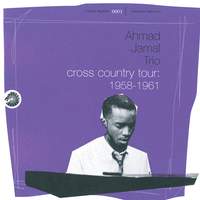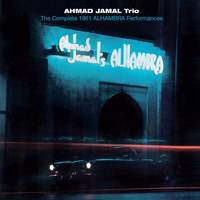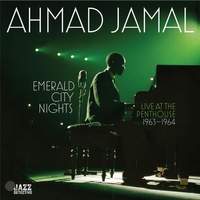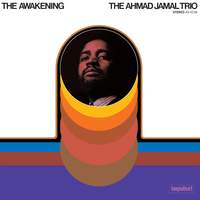Obituary,
Ahmad Jamal (1930-2023)

“I have always thought Ahmad Jamal was a great piano player who never got the recognition he deserved.” So wrote Miles Davis in his autobiography, published in 1989. What a shock it would have been for the legendary trumpeter, then, to see tributes pour in by the score throughout the digital and printed press for the pianist who passed away on April 16th at the age of 92.
Known for the disciplined musical control displayed in his solo and ensemble recordings alike, Jamal’s signature was a heightened rhythmic and spatial awareness that seeped across his ensemble’s playing as a whole. Similarly, he could make virtuosic displays that evoked the glitzy showmanship of the likes of his two biggest influences, Art Tatum and Erroll Garner. This is unsurprising, given that the former had previously acted somewhat as a tutor to Jamal, who met the stride giant at the age of 14. Despite his young start, however, Jamal was by no means in any way underripe. Born Frederick Russell Jones in 1930, he grew up a child prodigy, absorbing the music of his Pittsburgh-compatriots and performing it on the piano in his mother’s home. At 20, he converted to Islam and Ahmad Jamal was born.
Opportunities came thick and fast to the Pittsburgh-born pianist. After beginning his career touring with the Four Strings in the late fifties, he laid down his first studio recordings with a slimmer outfit, consisting of Ray Crawford on guitar with alternating bassists Eddie Calhoun and Israel Crosby, in 1951. The following year, Ahmad found himself performing at Carnegie Hall paying homage to Duke Ellington alongside the likes of Charlie Parker, Dizzy Gillespie, Stan Getz and Billie Holiday. The oldest-surviving co-headliner on that bill, Jamal once described his recollections of the gig as feeling like “a bit of walking history.”

Perhaps his greatest success came at an early stage in the musician’s career with At The Pershing, a live trio album released in 1958. Having established the more stable lineup following the introduction of drummer Vernel Fourier along with Crosby on bass, the result of these sessions surpassed forty individual tunes, but, in the end, Jamal chose only eight to make up the final tracklisting. It would prove an incredible success, the likes of which had been unseen on the jazz scene prior, and quickly reached sales of a million copies. Quick to detract any positive correlation between artistic quality and commercial appeal, the critical rendering of his work as crowd-pleasing cocktailbar entertainment was an image Jamal fought hard to overcome throughout the next decade. But many saw the light. As previously mentioned, Miles Davis was a huge admirer and would often drop in on performances to hear the sweepingly imaginative moods conjured up by Jamal and his crew.
In spite of his skyrocketing to fame, Jamal resisted the tug of corporate interference in his work, recording and releasing solely on his terms and his alone. The next few years were marked by several impressionable live recordings and residencies, including Live At The Alhambra (Jamal’s own establishment in Chicago) in 1961, and the Penthouse, Seattle, between ‘63-66. So remarkable are these recordings that Jamal’s name rarely appears in print without being suffixed by ‘Trio’. Always preferring informally to use the term, ‘team’, rather than aforementioned ‘trio’, Jahmal moved back into the studio from the mid-sixties, accompanied by Jamil Nasser on bass and Frank Gant on drums therein marking the third of his many notable lineups. Never one to view life through rose-tinted glass, Jamal always looked forward to growing as a musician and evolving as an artist, even if that meant largely devoting his output between original compositions and tunes from the first half of the twentieth century. Rather than regarding the Great American Songbook as a relic from the past fit for the occasional spring clean, however Jamal’s oeuvre is filled to the brim with classic jazz standards, which he dubbed ‘American Classical Music’. For Jamal, he believed there was no temporal distance in jazz, often refuting that “there’s no such thing as old music.”
In his later years, he was particularly proud of co-managing Japanese virtuoso, Hiromi, from the offset of her professional career, right through to helping her break on the world stage. His final studio album, Ballades, was released in 2019 and is made up of solo piano recordings that represent a lifetime of exploration and self-discovery. The rich legacy he leaves behind comprises a discography that pre-dates the birth of cool jazz, spanning through the spiritual dimensions of the sixties and seventies, to the growing sophisticated image of jazz music that blossomed towards the turn of the millennium. Explaining his fondness for older tunes, Jamal once stated that artists craving respect ought to first show respect to the music they play and the practices they inherit. What is clear is that many will now be paying respect, perhaps overdue, to the late pianist from here on out.
Above: Young Ahmad Jamal playing piano, ca.1942 (Image: Heinz Family Fund)
Have a listen to some of our favourite Ahmad Jamal recordings...
Available Formats: MP3, FLAC
Available Format: 2 Vinyl Records
Available Format: 2 Vinyl Records







